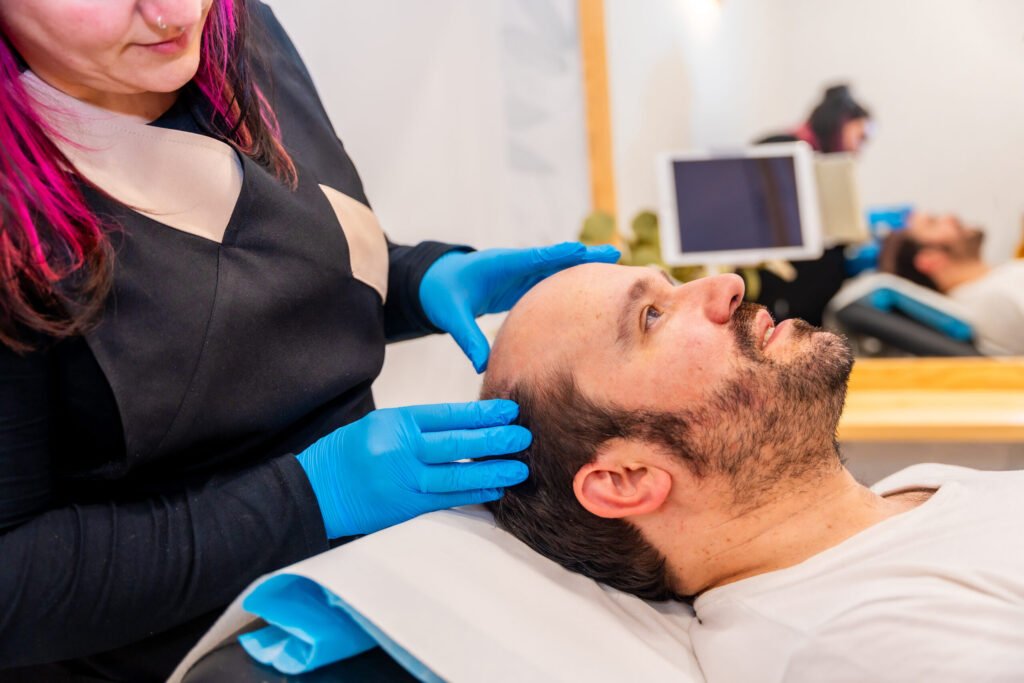Hair loss is a common issue that affects millions of men worldwide, and while over-the-counter products are widely marketed, the best results often come from professional medical evaluation. Choosing the right hair loss doctor can significantly impact your treatment success and long-term hair health.
✅ 1. Understand Which Type of Doctor You Need
Different specialists handle different aspects of hair loss. Depending on the root cause, you may need:
- Dermatologist (MD or DO):
Specializes in skin and scalp conditions. Ideal for diagnosing male pattern baldness, alopecia areata, scalp infections, and prescribing medical treatments (e.g., finasteride, minoxidil, JAK inhibitors). - Hair Transplant Surgeon:
A doctor (often a dermatologist or plastic surgeon) trained in hair restoration surgery such as FUE (Follicular Unit Extraction) or FUT (Follicular Unit Transplantation). - Trichologist:
A non-medical hair and scalp specialist. Can assist with mild or early-stage hair issues but cannot prescribe medications. - Endocrinologist:
If your hair loss is suspected to be hormone-related (e.g., thyroid issues or low testosterone), this specialist may be involved.
🩺 2. Check Qualifications and Credentials
- Board-certified in Dermatology or Plastic Surgery.
- Fellowship training in Hair Restoration Surgery (such as through the International Society of Hair Restoration Surgery – ISHRS).
- Licensed by your country’s health regulatory board.
- Check for affiliations with respected organizations (e.g., AAD, ISHRS, ABHRS).
🧾 3. Ask the Right Questions
When evaluating a potential doctor, ask:
- What is your experience with male hair loss patients?
- Do you specialize in a specific type of treatment (medical, surgical, laser, etc.)?
- Can you show before-and-after photos of previous patients?
- What diagnostic tools do you use (e.g., scalp biopsy, dermoscopy, blood tests)?
- What treatments do you recommend for my specific condition?
- Do you provide follow-up care or maintenance plans?
- What are the risks, costs, and realistic outcomes of the treatment?
🔍 4. Look for Comprehensive Diagnostic Approach
A good hair loss doctor should not offer “one-size-fits-all” treatments. Instead, they should:
- Conduct a detailed medical history review.
- Perform a scalp and hair analysis.
- Offer lab tests if hormonal or nutritional issues are suspected.
- Customize the treatment plan based on the type and stage of hair loss.
💬 5. Evaluate Communication and Transparency
- Does the doctor listen attentively to your concerns?
- Do they explain treatment options clearly, including side effects and timelines?
- Are they honest about what’s achievable, or do they overpromise results?
Good communication builds trust and improves treatment outcomes.
💸 6. Review Cost, Insurance, and Treatment Options
- Hair loss treatment is often not covered by insurance, especially if cosmetic (e.g., hair transplants).
- Request a detailed cost breakdown (consultation, diagnostics, medications, procedures).
- Ask about payment plans or financing options for expensive procedures.
Be wary of clinics that push you into contracts or expensive packages without thorough evaluation.
🚩 7. Red Flags to Watch Out For
- Guarantees or promises of “permanent results.”
- Lack of medical credentials or unclear specialization.
- No diagnostic testing before offering treatment.
- High-pressure sales tactics or hard-selling of products.
- Vague or no follow-up plan after initial treatment.
🌍 8. Check Reviews and Reputation
- Read verified patient reviews on platforms like Google, Healthgrades, or RealSelf.
- Look at before-and-after photos and video testimonials.
- Join online forums like Reddit (r/tressless) or HairLossTalk for honest feedback.
🧠 9. Consider the Treatment Philosophy
Different doctors have different philosophies. Some may emphasize non-surgical approaches (like minoxidil, finasteride, PRP, LLLT), while others might prioritize surgical options. Choose a doctor whose approach aligns with your preferences and goals.
✨ Bonus Tip: Consider Clinics Offering Multi-Disciplinary Care
Top-tier hair loss clinics often have:
- Dermatologists
- Surgeons
- Trichologists
- Nutritionists
- Hormone specialists
A multidisciplinary approach gives you the most comprehensive care.
📌 Summary Checklist
| Criteria | ✅ Check |
|---|---|
| Board certification (Derm/Plastic) | ✅ |
| Specializes in male hair loss | ✅ |
| Offers diagnostic testing | ✅ |
| Customizes treatment plans | ✅ |
| Transparent about costs and risks | ✅ |
| Positive patient reviews | ✅ |
| No hard-sell tactics | ✅ |
| Offers follow-up support | ✅ |




